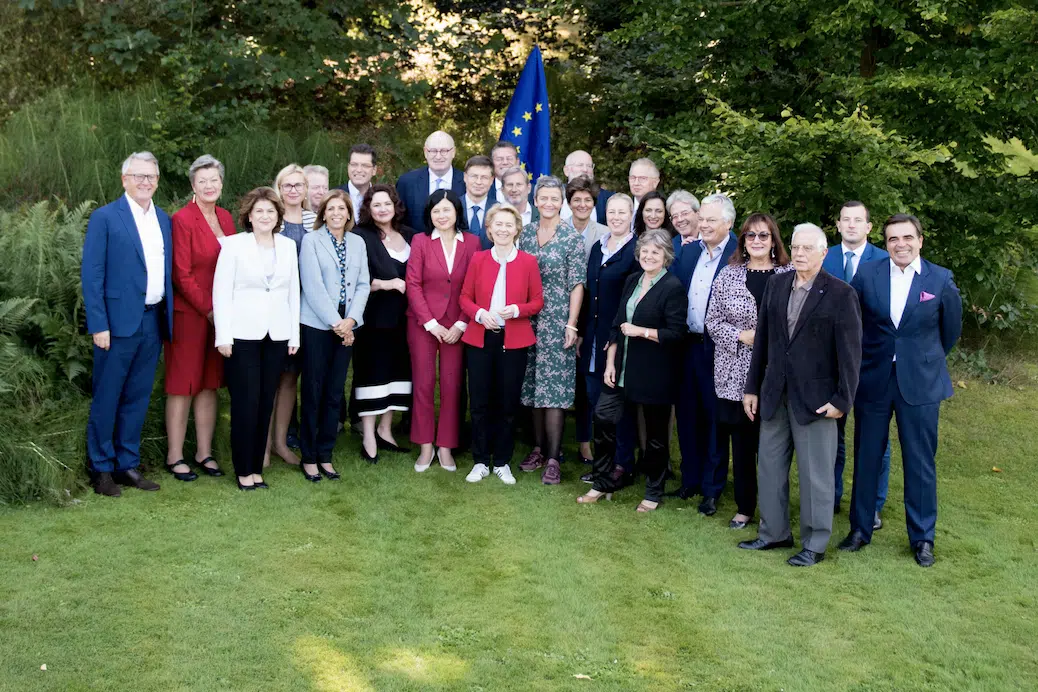Brussels – With the appointment—after time—of Hadja Lahbib, Foreign Affairs Minister in the resigning government of Belgium, the range of European commissioner candidates is complete. Only one country out of 27, Bulgaria, listened to Ursula von der Leyen’s request to submit two names, one man and one woman, to ensure gender parity in the next College. The others went straight ahead, and the result is that the next European Commission will most likely be heavily male-dominated. Of the 28 profiles on von der Leyen’s table (including herself and Bulgaria’s two), only 10 are female names.
The only exception von der Leyen had admitted to his request concerned possible confirmations of current commissioners. This was the case for Croatia, which reappointed Dubravka Šuica, a former Vice-President in the last European Commission; for France, which confirmed the current Internal Market Commissioner, Thierry Breton; for Hungary, which reappointed the Commissioner for Enlargement and Neighborhood Policy, Olivér Várhelyi; for Latvia, which reappointed Executive Vice President Valdis Dombrovskis; for the Netherlands which reappointed current Climate Commissioner Wopke Hoekstra, and for Slovakia, which reappointed current Executive Vice President Maroš Šefčovič.

With the other 19 new profiles, 14 members of the next European Commission are expected to be expressions of the European People’s Party, while liberals and socialists would count five commissioners each. The Italian candidate, Melonian Raffaele Fitto, would be the only European Conservatives and Reformists member.
Now the German leader, freshly confirmed for her second term, will have to distribute portfolios to her “ministers”, including vice-presidencies and possible executive vice-presidencies. According to what was revealed by the German daily Die Welt, von der Leyen is reportedly leaning toward appointing four executive vice presidents, including Fitto as head of the Economy and the Recovery and Resilience Plan. It would be the first time for a member of a radical right-wing party to hold the vice-presidency of the EU institution. The other three would be Spanish socialist Teresa Ribera, Executive Vice-President for climate, digital and social transitions; French liberal Thierry Breton, to industry and strategic autonomy; and popular Latvian Valdis Dombrovskis, Executive Vice-President for enlargement and Ukraine reconstruction.
But first, von der Leyen is trying to press some countries to rebalance the gender gap in the next College: already back on its heels is Romania, which, as Premier Marcel Ciolacu announced at a press conference, has replaced candidate Victor Negrescu, newly appointed Deputy President of the European Parliament, with MEP Roxana Mînzatu, also a Social Democrat.
Once final, von der Leyen’s team will have to go through the EU Parliament; one at a time, between late September and October, the commissioner candidates will be put through the wringer in three-hour hearings by the parliamentary committees of the Strasbourg Chamber.
The procedure stipulates that, once appointments have been made according to the policy guidelines outlined by von der Leyen, the relevant parliamentary committees evaluate each commissioner nominee, before a plenary vote on the appointment of the entire College. Before the confirmation hearings, the nominees go through the Parliament’s legal committee, which thoroughly reviews their declarations of financial interests. The final step involves a vote of confidence by the entire EU Parliament to elect or reject the new European Commission by a majority of votes.
The EU Parliament hearing process is by no means a foregone conclusion: in 2019, in the process of forming the first von der Leyen Commission, three appointments were rejected: the nominees from Romania and Hungary during the preliminary examination of conflict of interest declarations, and Sylvie Goulard, Emmanuel Macron’s French nominee later replaced by Thierry Breton.
English version by the Translation Service of Withub


![La presidente della Commissione europea, Ursula von der Leyen, alla conferenza annuale degli ambasciatori [Bruxelles, 4 febbraio 2025]](https://www.eunews.it/wp-content/uploads/2025/02/vdl-ambasciatori-350x250.png)


![Commission chief Ursila von der Leyen and Chinese premier Li Qiang in New Delhi on 9 September 2023. [X,von der Leyen official profile]](https://www.eunews.it/wp-content/uploads/2025/04/F5l3CdoagAAUnig-350x250.jpg)




